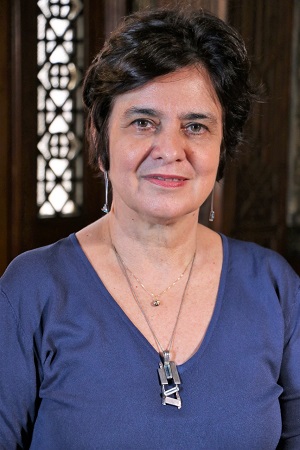Nísia Trindade Lima is nominated for second term as president of Fiocruz
15/01/2021
Fiocruz
 Nísia Trindade Lima was renominated for the position of President of Fiocruz, for the period of 2021-2024. Lima was elected on the first place of the three-name list unanimously homologated by Fiocruz Advisory Board, which was handed to the Health Minister, Eduardo Pazuello, last November. Fiocruz 2020 elections were the most significant in the institution’s history, with the participation of 4,400 voters - 91.6% of the 4,847 employees that are eligible to vote.
Nísia Trindade Lima was renominated for the position of President of Fiocruz, for the period of 2021-2024. Lima was elected on the first place of the three-name list unanimously homologated by Fiocruz Advisory Board, which was handed to the Health Minister, Eduardo Pazuello, last November. Fiocruz 2020 elections were the most significant in the institution’s history, with the participation of 4,400 voters - 91.6% of the 4,847 employees that are eligible to vote.
The president of the institution has been chosen through an election among its civil servants since 1989, the same way it’s done in Brazilian public universities. The democratic process in Fiocruz followed the country’s re-democratization after a military dictatorship that ruled Brazil for 20 years. In the election process, each Fiocruz employee can vote on up to three candidates, indicating the preferred order of first, second and third places. The three-name list is formed by candidates that got over 30% on the sum of the three positions from the total of valid votes. This list is forwarded by the Advisory Board to the minister of Health, and then to the President of Brazil, who carries out the nomination.
In 2020, Nísia Trindade Lima received 3,784 votes for first place (87% of valid votes). “I’ll be everyone’s president one more time, increasing the dialogue both internally and with government spheres, branches of power, and civil society. I promise to keep leading our institution with the same involvement, serenity, and resolution as in the past four years”, the president stated in the letter thanking the Fiocruz community.
Strengthening Democracy
The president says that the election was a result of the strengthening of democracy inside the institution. “After this process, we’re more united and aware of our role in society, even more during these difficult times we are going through”, she stated. “I shall take this opportunity to express my condolences to the families of the victims of Covid-19 and reiterate Fiocruz’s commitment, as a State institution and a patrimony of society, to have science, technology, and innovation in the service of life and the Brazilian Public Health System, as its main guideline”.
Campaign Platform
On her campaign platform, the president committed to promote Fiocruz’s systems synergy and the institution’s integrity by means of establishing management arrangements that promote the strengthening of the units’ capabilities and the coordinated action of those units to achieve results for the health system (SUS, in the Portuguese acronym) and for science and technology; to strengthen the integrating and inseparable bond between Science, Technology and Innovation (STI), education and the SUS, as essential aspects to the strengthening of the Nation; and to update the infrastructure in science, education, information, and communication, as well as the platforms of future knowledge, in order to get Fiocruz in place with the 4th Technological Revolution, among other guidelines.
Among the commitments taken on to the second term are incorporating contemporary forms of structure and management of STI, aimed at meeting social needs; strengthening the Economic-Industrial Health Complex as a key element to reduce the system vulnerability; promoting innovation in public management by means of the valorization of Fiocruz’s employees and managers creative abilities; promoting the valorization of work and public servants by means of encouraging career development and protection of rights; and advancing in respectable work perspectives, promoting permanent improvement in living and working conditions in Fiocruz, especially when it comes to the worker’s health.
Profile
The first woman elected as president in Fiocruz’s history, Nísia Trindade Lima is a Ph.D. in Sociology and works for the Foundation since 1987. She entered the institution as a researcher in Casa de Oswaldo Cruz (COC/Fiocruz), the unit dedicated to the history of science and health which she was the director from 1999 to 2005. She was part of the Editorial Board at Fiocruz publishing house, of the scientific committee and of the Executive Commission of the 4th Science Centre World Congress, and of the organizing committee of events that were part of the Chagas disease centennial anniversary celebration.
From 2011 to 2016, while being Vice-President of Education, Information and Communication (Vpeic/Fiocruz), she became a member of the advisory board of the Open University System of the Unified Health System (UNA-SUS). In 2012, she became part of the workgroup for the implementation of Fiocruz Piauí and started the negotiation to implement the SciELO Books Network, which currently has millions of downloads and has a strong prominence of the Foundation.
In the context of the commitment to the democratization of knowledge and access to information, the Virtual Health Libraries Support Program, Fiocruz Institutional Repository (Arca), and institutional policies of open access and communication were launched during her term. In 2015, Lima received the Nise da Silveira Award in the female scientist category, given by the Special Office for Women Policies of the Municipal Government of Rio de Janeiro.
Lima is part of the Zika Alliance Network since 2018, a multinational and multidisciplinary research consortium composed of 54 partners from all over the world. Recently, she took over as co-chair of the Health For All Network of the UNSDSN and as co-chair of the Economic Recovery Steering Group to advise on the development of the United Nations Research Roadmap for the COVID-19 Recovery. In September of 2020, Lima received the title of Honorary Professor from the Federal University of Rio de Janeiro (UFRJ). Last December, she was elected a full member of The Brazilian Academy of Sciences (ABC), in the Social Sciences category.


